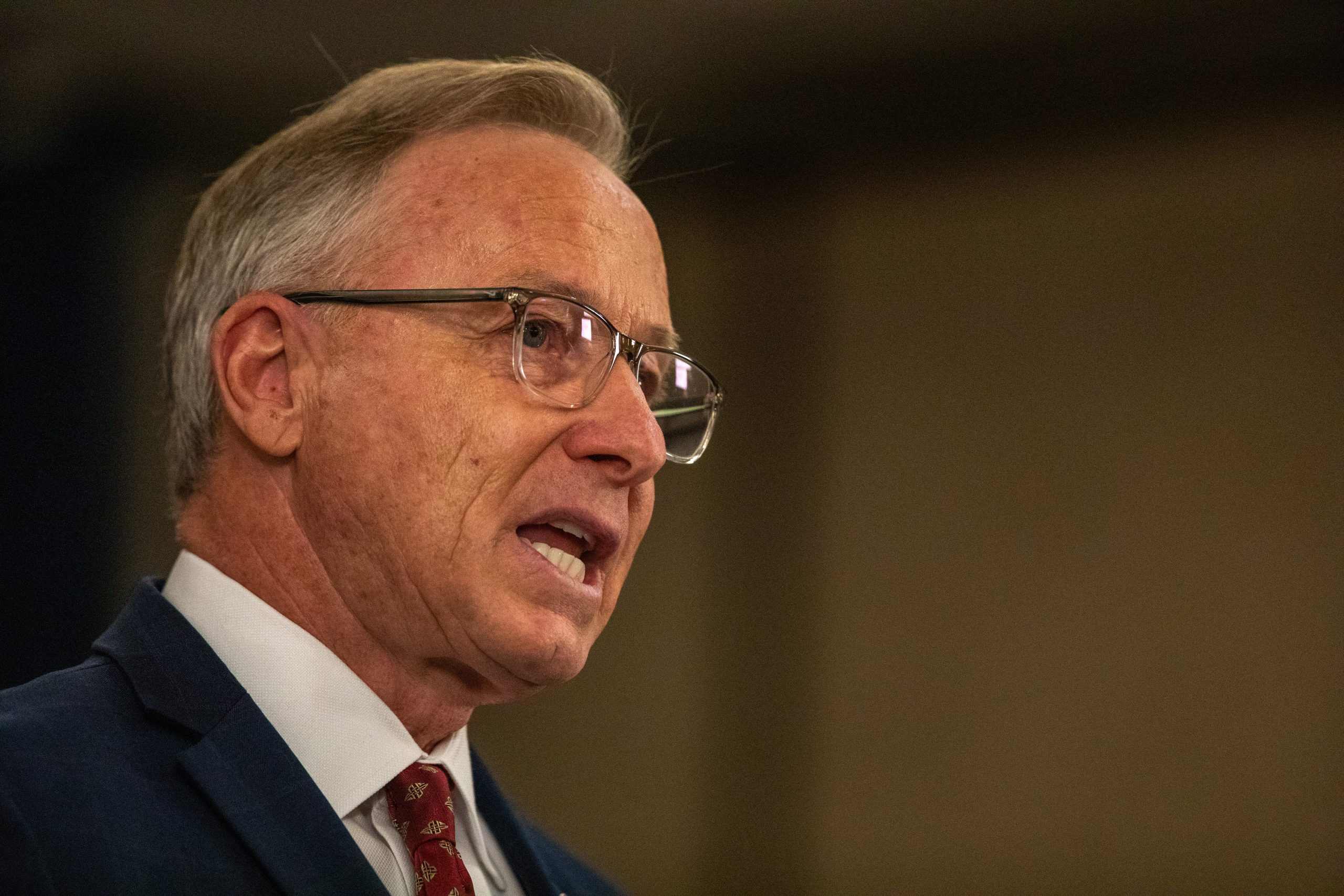- Slug: BC-CNS-Hobbs Hundred, 810 words.
- 2 photos available (thumbnails and captions below).
By Piper Hansen
Cronkite News
PHOENIX — Three months into Democratic Gov. Katie Hobbs’ stint as Arizona’s 24th head of state, negotiations with GOP leaders in the Legislature on a budget are close to completion, Hobbs said Wednesday at a news conference to celebrate the first 100 days of her term.
Since taking office, Hobbs has had to change or compromise on some campaign promises, because most would have taken strong bipartisan support — something she’s still working to establish with her Republican colleagues who are slowly becoming open to working with her.
But with budget talks in the final stages (when state budget negotiations typically stretch into the summer), and both sides of the aisle in agreement that everyone’s priorities are represented, Hobbs and her administration are managing to look ahead.
“There’s certainly a lot of room to find common ground,” Hobbs said at a news conference at the State Capitol Executive Tower. “We have demonstrated that and the fact that I have been meeting regularly with leadership to talk about a budget. I think we’re very close to a bipartisan agreement there. I don’t think anyone thought we would be at that place in the first 100 days.”
A half-hour celebration of her first 100 days Wednesday heralded the 22 pieces of bipartisan legislation Hobbs has signed, the oversight commissions she’s created and her other efforts to address critical issues like education, reproductive health care and water conservation.
In her inaugural State of the State Address on Jan. 9, Hobbs said her priority was bipartisan cooperation with the Arizona State Legislature to invest in public education, confront affordable housing, lower the costs of services, agree on a realistic approach to immigration and to secure water resources for the state.
Bipartisan partnership with the Ninth Floor extends beyond just the Capitol, Hobbs said Wednesday. There is no “top down” administrative organization, she said, pointing to the “incredible” relationship her office has with Mesa Mayor John Giles, a Republican who attended the Wednesday event.
Giles said Hobbs has protected “local controls” that help Arizona cities and towns. “When local services and public safety funds were at risk, she used her veto stamp to ensure cities and towns like Mesa will continue to meet the needs of our residents,” he said.
Working “to build an Arizona for everyone,” Hobbs said her first 100 days would center around policy priorities and “tackling the biggest challenges facing Arizonans.”
But so far, Hobbs has gotten the most attention for what she hasn’t let pass. Hobbs has vetoed more bills than the last Democrat to hold the office did in her first year. Democratic Gov. Janet Napolitano vetoed just 17 bills in 158 days during her first year in 2003, and already Hobbs has vetoed more than 40, including numerous anti-LGBTQ+ bills that have crossed her desk and a budget bill that was passed without negotiations.
Hobbs said Wednesday she didn’t come to the governor’s office just to veto pieces of legislation, but that every single one was intentional. Arizona Senate Democrats tweeted Wednesday the series of vetoes had “protected Arizonans from bad policy and dangerous conservative attacks on personal autonomy.”
Polling suggests most Arizona residents still haven’t decided what to think about Hobbs as governor. Phoenix firm OH Predictive Insights tweeted Wednesday that Hobbs has a net positive approval rating, with 44% of registered Arizona voters in a recent poll saying they approve of her job performance, and 37% saying they disapprove.
Hobbs has been in public office for more than a decade, making an impression when she was secretary of state during the 2020 election audit and recount. At the start of her term as governor, the right-wing Arizona Freedom Caucus threatened legal action over several executive orders, and Senate Republicans refused to approve her choice to lead the Arizona Department of Health Services.
There have been other staffing challenges: Hobbs’ press secretary, Josselyn Berry, was forced to resign after she tweeted an image of a gun-wielding woman with the caption, “Us when we see transphobes.” Other personnel changes followed, including the creation of a new deputy chief role.
At Wednesday’s news conference, however, Gila River Indian Community Lt. Gov. Monica Antone said Hobbs was a “true leader” in working at a fast pace to communicate with tribal leaders. Hobbs was the first governor to initiate a missing and murdered Indigenous women task force, Antone said.
“As tribal nations, we’re very honored to watch Gov. Hobbs in the first 100 days work at a fast pace for people — not just Indigenous people, but people of diverse communities,” Antone said.
José Patiño, vice president of education and external affairs for Aliento, a youth-led education nonprofit serving undocumented young people, recipients of Deferred Action for Childhood Arrivals and members of mixed-status families, said Hobbs is building her scorecard, but the group is “giving her the benefit of the doubt since it’s just the first 100 days.”
For more stories from Cronkite News, visit cronkitenews.azpbs.org.
^__=
Gov. Katie Hobbs speaks at a press conference to commemorate her 100th day as Arizona’s chief executive on April 12, 2023. (Photo by Drake Presto/Cronkite News)
Mesa Mayor John Giles speaks at a press conference to commemorate Gov. Katie Hobbs’ 100th day in office April 12, 2023. (Photo by Drake Presto/Cronkite News)

